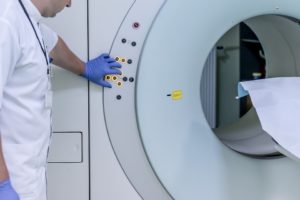 There are many methods of screening for and detecting breast cancer, which can be confusing for patients. Screening and detection methods include mammography, ultrasound, fine needle aspiration, core needle biopsy, and breast magnetic resonance imaging, or MRI. The Breast MRI is currently one of the most controversial methods of screening for breast cancer.
There are many methods of screening for and detecting breast cancer, which can be confusing for patients. Screening and detection methods include mammography, ultrasound, fine needle aspiration, core needle biopsy, and breast magnetic resonance imaging, or MRI. The Breast MRI is currently one of the most controversial methods of screening for breast cancer.
An article in the National Institute of Health’s World Journal of Oncology reports that while a Breast MRI may be somewhat useful in breast cancer detection for women who have a strong family history of breast cancer, it is not generally recommended as a screening tool.
One of the key problems with the Breast MRI, aside from it being very costly, is that it leads to too many false positive results. MRI is sensitive and detects unusual breast developments but is not able to always distinguish between benign and malignant tumors or lesions. Additional imaging or biopsy would be needed to follow up on any detected abnormalities, even if they were benign.
There are too many instances of MRI detecting secondary lesions which turn out to be completely benign, and the danger is that MRI screening leads to a more aggressive treatment than was really necessary.
Secondly, MRI lacks specificity. MRI often detects subclinical diseases that would never have been clinically relevant and rarely identifies the biologic behavior of a potential lesion with enough specificity to know how, or even if, to treat it. As a result, additional imaging or biopsy is again required.
Breast MRI is also considerably more expensive than mammography or ultrasound. Mammography remains the the single most appropriate tool for general population breast cancer screening to reduce breast cancer–related mortality rates. Use of any supplemental screening modalities should be tailored to each individual based on personalized risk assessment and the density of your mammogram.
When Breast MRI’s Are Recommended
There are some instances, however, when Breast MRI’s are informative and recommended. Occult breast cancers are those breast cancers not seen on mammogram or ultrasound. These cancers are usually thought of as a secondary, or synchronous, breast cancer, when a Breast MRI is performed on someone who has breast cancer. Three percent of women with breast cancer will have an additional, or occult, breast cancer identified by MRI. But no study has proven a benefit, in terms of survival or local recurrence, of treating these occult malignancies.
Some cancers are found in a lymph node but not in the breast on mammogram or ultrasound. Breast MRI is used in this situation to search the breast for the primary breast cancer. Treatment of the breast is then determined on the findings of the Breast MRI.
I order Breast MRI for women with breast cancer in a judicious manner. I may order Breast MRI if their mammograms are dense, if they have a family history of breast cancer, or if their mammogram or clinical findings suggest more extensive disease about which I am concerned. Not every woman with breast cancer needs a Breast MRI, but they can be very helpful in many situations.
If you’d like to discuss any concerns about Breast MRI’s, breast cancer detection, or the most successful surgical treatments for breast tumors, consult with Dr. Aaron Margulies. Committed to serving breast cancer patients through his solo practice in Breast Surgical Oncology and General Surgery, Dr. Margulies has offices at Tennova Turkey Creek Medical Center in West Knoxville, at Tennova North Knoxville Medical Center in Powell, at Jefferson Memorial Hospital, and in Newport. His extensive research and expertise have distinguished him as a leader in the field. To learn more about Dr. Margulies’ compassionate surgical care approach visit www.aaronmd.com or call (865) 692-1610.
